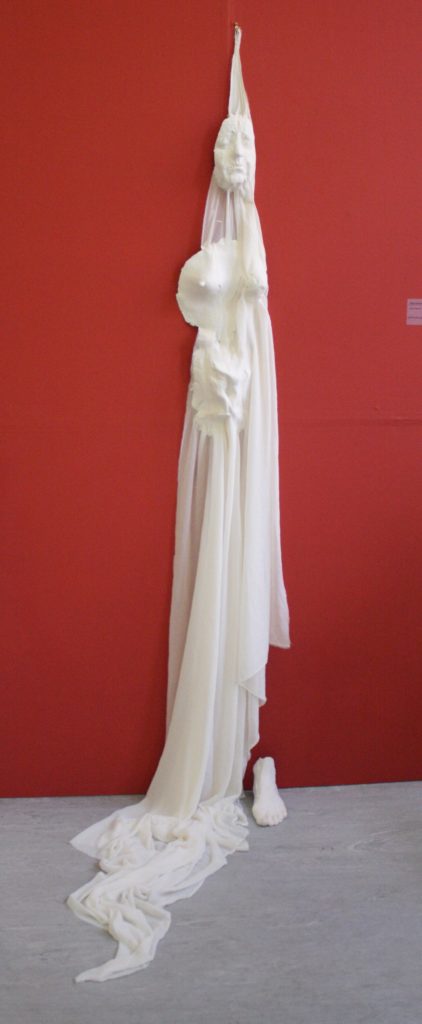
MA Visual Arts: Designer Maker – graduated July 2019. Empathy underpins her practice and is a development of her background as a costume designer in contemporary dance. Abigail explores narrative through shapes made by the human body in stillness and movement, through performance, artefacts and video. Its current form takes her personal narrative of experiencing the menopause, engages with scientific theories and diagnoses and draws on the voices of other women. Underpinned by feminist theory, being seen and heard, her work has been sited in both gallery and community spaces to promotes awareness of menopause.
ARTWORK
Can you see me? #29
Jesmonite and textile
£1220
Can You See Me? #2 is part of an activist art project called M is for Menopause that explores what it is to be a menopausal woman.
With a primary focus on my physical and emotional experience I also engage with the voices of other women. Struck by how we not only share the many symptoms but also language in our expression of feelings of despair, dying and loss of self, I have included their voices in the accompanying soundscape created by music artist Latenites.
Can you see me? #2 combines casts of my face, breasts and belly taken in a horizontal position, with the full effect of gravity. This ‘falling’ reveals both the visual state of a mature body and the invisible dropping levels of the hormone estrogen that cause menopausal chaos. It is completed with a cast of my left foot, referencing classic statues, challenging ideals of beauty and the enduring strength of the mature woman.
The beauty of this material and process is the incredible detail captured, every wrinkle and pore. Laying fabric in the silicon mould before pouring in the Jesmonite acts as a barrier and only some of it reaches through to the surface of the mould with parts of the body only suggested. This partial visibility refers to the taboo of menopause and women’s unseen suffering.
There is a current wave of menopause awareness campaigns including a Menopause Work Place Policy in the UK, notably implemented by Channel 4 on World Menopause Day 2019. Through telling my story about this period of female metamorphosis, I hope to increase awareness, understanding and compassion.

Roadkill + Fuck the Menopause punk song, 2019
Jesmonite sculpture and song
£2990
With a background in costume design in contemporary dance, Abigail Hammond explores her ideas using shapes made by the human body in stillness and movement, through performance, artefacts and video. Her work articulates her own personal narrative of experiencing the menopause and engages with scientific theories and diagnoses, drawing on the voices of other women.
“Roadkill explores the violence of my own bodily experience: Menopause. Women are not prepared for this part of their lifecycle. For some it is simply that they cease to bleed. For others it is an onslaught of physical and emotional turmoil that can render them incapacitated, angry, even suicidal, over a number of years. This violent act of nature, our bodies in a period of chaotic transition, is exacerbated by age-old discrimination against women and the rejection by society of that which is seen as the abject body. Women are messy and people don’t want to know about it. Within this context of violence, I also consider the lack of respect that can come from the medical profession. Many women speak of distressing doctor’s appointments where they are dismissively offered only antidepressants or HRT, leaving them feeling more desolate and violated than before.
Whilst researching other women’s experiences of the menopause on chat forums I was struck by how we used similar language to express our experiences. ‘Being hit by a bus or truck’ came up time and again. To have this shared language was reassuring, I wasn’t alone and I could take ownership of my sense of violence without feeling insane. I could now speak out about it.
The concept for the punk song Fuck the Menopause was to share and exorcise a sense of anger and injustice and to say loud and clear that we are not done yet! It is explicit in terms of communicating some of the symptoms, as is the name of the ‘band’ ‘Vaginal Atrophy’. The combination of the sculpture and soundtrack is an intentionally odd juxtaposition. The song is authentic, defiant and cathartic. What they share is rawness. My work is activism, and a significant part of my practice is to talk to people alongside showing the work. Menopause is not just a women’s issue, everyone needs to know about it. With knowledge and support maybe women’s experience of menopause can be less violent.”



